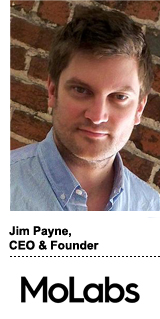 Facebook and Google may hoover up 85% of incremental digital ad dollars, but that doesn’t mean it’s time for the LUMAscape companies to pack it in.
Facebook and Google may hoover up 85% of incremental digital ad dollars, but that doesn’t mean it’s time for the LUMAscape companies to pack it in.
Facebook is “not where the smart money is being spent,” said Jim Payne, co-founder and former CEO of MoPub, speaking at the Acceleration show hosted by mParticle in New York City on Thursday.
Facebook is great at autoplay, content delivery network caching and serving up the videos users are looking for, but Facebook isn’t all that helpful when it comes to helping creators get distribution outside its walled world. (Obviously.)
“We believe that in an ecosystem of video creation and distribution, we need to think about alternative consumer destinations,” Payne said, who stayed on at MoPub for about a year after the mobile exchange was acquired by Twitter in 2013. (His new venture is called MoLabs, an idea incubation startup focused on developing consumer-facing products.)
According to Morgan Stanley, 85% of every incremental online ad dollar is destined for Facebook or Google in Q1 2016. Technology Business Research’s estimate comes in far lower at 57% for Facebook and Google combined. Regardless, it’s a heck of a lot.
But in either case, a portion “of spend is still going to people who really understand what long-term user acquisition is all about,” said Payne.
Although the vastness of the ecosystem speaks partially to its health, the mad crush of LUMAscape companies has also created an imbalance between the needs of advertisers and publishers and the ad vendors that serve them – or, in a lot of cases, gouge them.
A lot of the “funky stuff” – viewability, ad blocking, et al. – that’s happening is “more of a symptom of publishers not being able to monetize as well, and when they do, completely ruining the user experience,” said Michael Katz, CEO and co-founder of mParticle.
It’s part of what makes Facebook feel like a safer option, even though some marketers and publishers are starting to get a little uncomfortable with their growing dependence on the platform.
“If you look at the LUMAscape, there are so many people who are trying to get a slice of each dollar that gets spent,” Payne said. “Ultimately, that should be from marketers to the publishers, but there are a lot of people in the middle looking to get their 30% or 40% cut – and obviously, there can only be so many cuts.”
Which is why if the programmatic ecosystem is going to keep growing, the margins have to start shrinking, Payne said.
“Facebook is basically consolidating all features into one single platform because they know everything about everyone and they can pull that off,” he said. “The only way to counterbalance that is a more efficient alternate ecosystem.”
Story updated to add “incremental” to the first sentence.











